New perk! Get after it with local recommendations just for you. Discover nearby events, routes out your door, and hidden gems when you sign up for the Local Running Drop.
Three Women, One State, Once Championship Team
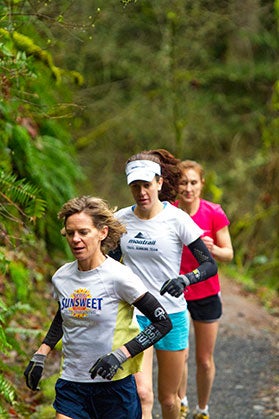
U.S.A. 100K World Championship teammates Meghan Arbogast, Amy Sproston and Pam Smith on a training run in their backyard- Oregon’s Willamette Valley. Photo by Justin Bailie.
Underneath a canopy of towering firs, dawn redwoods and giant magnolia, three women run quietly in single file. Despite the steepness and slippery mud of the trail their gaits are fluid, and their breathing even. As the rain picks up, so does their pace, and before it can begin to truly pour the women have disappeared around a bend in the trail. But for the ease of their strides and the comfort of their silence they could have been any women, the trail could have been in any place. They are not any women, however, and this is not any place.
Pam smith, Amy Sproston and Meghan Arbogast form the heart of the U.S.A 100K World Championship team, and they are running on their home turf in Oregon’s Wil lamette Valley. In this strip of primarily agricultural land set between the state’s rainy coastal mountain range and its noticeably taller and more rugged Cascade Range, the three are forming new standards for the sport as they consistently take top podium spots, break records, balance careers and family and destroy past expectations depicting that of which women are capable.
At the 2011 100K world Championships, Sproston, smith and Arbogast led the six- person U.S. team to a silver medal. In 2012, they led the team again, and this time, all the way to gold. Sproston posted first overall. According to their team manager, Lin Gentling, if their current race and training results are any indication, there is little that will stop them from a repeat performance in 2013. The 2013 race, which will be held in October in south Korea, is still a long way off. And right now in Oregon, Sproston, smith and Arbogast have running obligations to attend to in addition to their personal, familial and professional lives. And while the trio has vastly different lifestyles, they have this in common: the responsibilities of kids, jobs and/or homes act not as deterrents from their running but as fuel for it. Here we introduce you to how they do it.
Back on the trail the wind has picked up. As the tree limbs are pushed first one way then another, smith, Sproston and Arbogast appear and disappear as they make their way to the ridge top. In the rain, running though mud and wind, they are clearly Oregonians, yet blazing bright on the back of their red jackets are the letters, U.S.A.
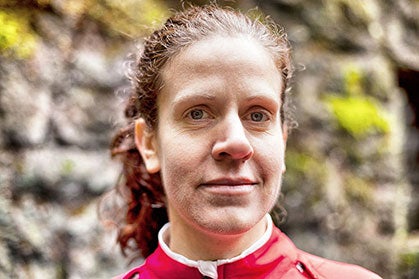
Photo by Justin Bailie.
Amy Sproston
The World Traveler
Sitting on the couch in her home in Northwest Portland Amy Sproston stretches out her long legs and props her feet on the coffee table in front of her. Though she has a minor cold, she’s opted to treat it with a cold microbrew and cough syrup rather than the herbal tea that sits in the cupboard by the stove. next to the couch is a bookcase filled with titles describing places like Morocco, Palestine, Afghanistan and the Philippines. Damp running shoes are piled by the front door, and a laptop bag sits on the kitchen table.
Sproston is a recent transplant to Oregon from the east coast. She came out west for the 2009 Waldo 100K, fell in love with trails and moved shortly afterward largely because of the natural beauty of the state. Now that she’s here she’s found more reasons to stay, including a great book club, regular opportunities for salsa dancing, good beer, strong coffee and a job she loves.
Sproston, 37, works on the financial side of the international nonprofit mercy corp, a group that works to stop suffering and poverty worldwide. For that job, she travels extensively, often making between three and four international trips each year.
“When you’re traveling that much, you begin to look at the world differently. As a Westerner, you learn to not take things for granted,” says Sproston. “As a woman, I’ve come to really appreciate just being able to run safely out in the open. In places like South Sudan, that is not always an option.”
On a recent work trip to Iraq, Sproston was discouraged from venturing outside of her accommodations after dark. It would not have been an issue except most of her hours available to train were after dark. The few times she did take to the roads she was berated by a constant stream of honking horns and uncomfortable stares.
“It was fairly evident that they hadn’t seen many women runners,” she says of the experience.
To get her miles in, Sproston ended up running loop after loop around the apartment complex where she was staying.
“In Iraq you don’t run through the streets and blend in, like you do in Portland,” she adds. “Things that are typically easily dealt with—like stopping to use the bathroom during a run—become challenging when all of the signs are in Kurdish.”
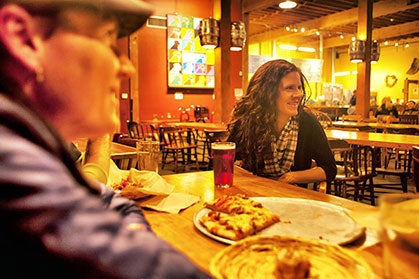
Sproston back home between her frequent international trips. Photo by Justin Bailie.
When she’s home, her normal routine consists of walking out her front door to run in Forest park, a network of more than 80 miles of trail just minutes away. She tries to clock between 50 and 60 miles per week, but isn’t always successful.
“My highest mileage training weeks are only ever around 70 miles,” Sproston says, rolling her beer bottle between her hands. “I can rarely make a concrete training plan due to my travel schedule, but sometimes I’m able to combine work trips with races.”
At 5’9″ she has a long stride that eats up miles, and her natural athletic ability helps keep her running hard even when her training is sporadic. She ran cross country for Luther college in Iowa. Ten years later, she moved to Washington, D.C., and became a member of the Virginia Happy Trails running club. The group launched her into trail running and ultras. The more she ran on the trails, the more she realized she favored long distances. If her 2012 finish at the World championships is any indication, the 100K might be Sproston’s ideal distance.
“I started running when I was in seventh grade,” she says. “I went out for track and ran the mile because I was too slow to sprint.”
Sproston focuses primarily on distances 50 miles and longer, though she will jump into the occasional shorter race usually because either the company or the costumes can’t be beat.
“Running has always centered me,” she says. “I want to run well, but the pressure that can come with racing isn’t something I enjoy. I’ve learned that the longer a race is, the less it usually feels like racing.”
(Winthrop, WA), 2012
(Squaw Valley, CA), 2012
(Squaw Valley, CA), 2011
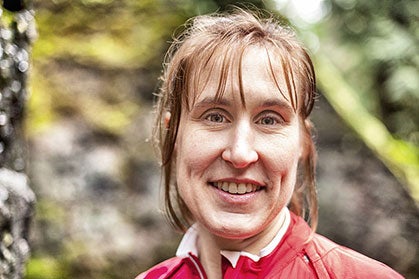
Photo by Justin Bailie.
Pam Smith
The Balancing Act
Pam Smith opens the door to her home in the hills above Salem, Oregon, wearing ballet flats, leggings, a short dress and a cardigan. Her blond shoulder length hair is clipped back and she has on just a touch of make-up. She looks pulled-together and petite. This is a distinctly different woman from the Pam Smith who regularly crosses race finish lines completely spent, covered in mud and snot, and at the front of the pack.
“Racing for me is about giving it everything,” says Smith. “It’s about taking yourself to the very edge where your body can’t go anymore, when your emotions are raw.”
Smith’s first experience with such an effort came when she clocked the fastest mile for girls in her ninth-grade physical-education class. it was the first time she saw running as a competitive endeavor, and the competitive aspect of racing coupled with the recognition that comes with success fueled her.
“It made me feel good about myself to be good at something,” says Smith.
The race and the positive reinforcement she received from her dad launched Smith into competitive running in high school and then at Williams College in Williamstown, Massachusetts, where she walked on to the cross-country and track teams. After college she went on to medical school and now, at 37, she works four 10-hour days a week as a pathologist specializing in blood disorders.
Smith is also a mom to a seven-year-old daughter, Megan, and five-year-old son, Liam. With the support of her husband, mac, who is also a runner, Smith clocks between 70 and 90 miles a week, most of them before dawn, and competes in 10 to 15 ultras a year.
“Pam has priority on early mornings Monday, Tuesday and Thursday because that’s when her running friends run,” says mac. “I have priority on Wednesday and Friday early mornings. On Wednesday evenings, we have a standing running/date night, where we get in a quality speed workout together and then catch a meal with friends.”

As a family, the Smiths are committed to modeling healthy exercise and lifestyle behavior for their children. Pam has turned the backyard of their modern home into a lush garden where she keeps chickens and grows the majority of the family’s produce. And despite soccer practice, dance classes, homework and music lessons, family dinners, which mac often cooks, are part of the routine.
“It can be easy to get overwhelmed by the day-to-day things, but going out for a run in the early morning is straightforward and it sets the tone for the day,” says Smith, who often goes to bed at around 8 p.m. with her kids in order to make sure she has the energy to get up to run.
“If pam says she will show up for a training run you can bet she will be there, rain, sun or snow,” said Smith’s long-time running partner, Dan Meiries. “She’s kind of like the post office—she always delivers. That kind of peer pressure gets a runner out of bed on a lot of mornings when it would be easy to bail.”
Smith’s commitment and dedication have helped get her to the finish line of some of the world’s toughest races, including the 100K World championships, but she said she is careful to not let running overwhelm her life.
“Being a runner is a large part of who I am, but it doesn’t compare to being a mother, wife and daughter,” says Smith, adding that her dad was a “prototypical 1970s jogger”— picture terry-cloth sweatbands, short-shorts and a dedication to the nation’s fitness craze—who encouraged her to run and be active. “Running was something we shared, and now being able to share it with my own family is an amazing experience.”
This statement is underlined by Smith’s recollection of her favorite race from the last year. Despite running more than 10 ultra trail races, including Texas’ Bandera 100K and California’s Western States 100-mile endurance run, and placing in the top three in seven of those races, her most rewarding race was a family friendly 5K Turkey Trot that she ran with her kids.
“The race culminated in three hours at a local water park with the whole family,” she says. “It was a great day.”
Recent Highlights
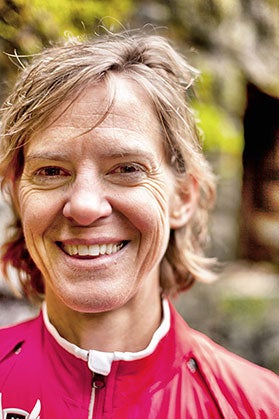
Photo by Justin Bailie.
The Queen
It’s 4:45 in the morning. Inside the main lodge at the Willamette Pass ski area in the western Oregon Cascades, a tall woman with long brown legs and short dark-blonde hair, floppy like a boy’s, is standing at the top of the staircase talking into a walkie-talkie. She’s wearing a down puffy coat and a short white running skirt with the Waldo 100K logo printed at the hemline. A group of runners pinning on bibs and adjusting headlamps on the stairs catcall up to her, and grinning like an imp, she turns and lifts the back of her skirt to expose her butt clad in spankies printed with 100-dollar bills.
The hooting that follows carries all the way out to the start line of Waldo 100K, a race held in the Oregon’s rugged western cascades each august. The woman, Meghan Arbogast, laughs and runs down the stairs to hand out hugs and pep talks for the race, which, after having won it twice, she is now helping to organize.
Ken Ward who organizes the McDonald Forest 50K in Corvallis, Oregon, Arbogast’s hometown, calls her “The Queen” of ultrarunning. It’s a nickname that others in the ultrarunning community have adopted for the 51-year-old who continues to grow stronger and faster as she ages.
Arbogast began running after the birth of her daughter, ruby, in 1987. She ran her first marathon, Portland, in 1994 finishing in 3:10. She has since raced in the Olympic qualifiers for the marathon distance four times, and holds a personal record of 2:45:43 from the 2007 Cal international marathon in California. She ran her first ultra race, the McKenzie river 50K, in 1996, finishing sixth. Trail running has had her heart ever since.
“I’ve been fortunate. I have good genes and my body is holding up really well,” says arbogast. “I think we overestimate the effect of age, and underestimate our ability to control our overall health. For me, it’s become much more about paying attention to my body and how it responds to training and stressors.”
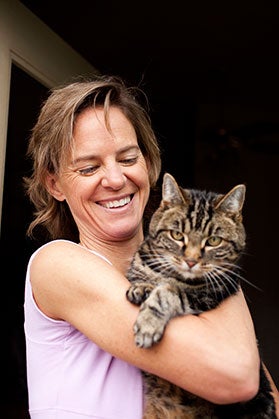
Photo by Justin Bailie.
Standing in her kitchen, the fun and laughter that seemed to overflow Arbogast at Waldo are muted. Her devilish streak
has been replaced by a calm stillness that
is underlined by the quietness of her home. Ruby has grown up and left home, and two years ago, Arbogast’s husband of 25 years, Brian, died of complications from a series
of brain tumors. He was an avid athlete and Arbogast’s primary support at many of her top finishes. She doesn’t talk much about his death, instead opting to live well and pursue her passions. She has a garden behind the house where she grows many of the fresh vegetables that fill her diet, and her office where she practices massage therapy is tucked into a front bedroom. A cat and dog help fill the space.
“Meghan has been through so much,” says Lin gentling, the team’s manager. “Yet through it all she has continued to live with grace and joy. She knows exactly who she is, and how she wants to live in this world. Her running is part of the way she expresses joy and love.”
Running is part of how Arbogast has faced life’s challenges. It’s an outlet and a balm, and racing might be the greatest expression of that.
“If I’m pinning on a bib and lining up, I’m racing hard,” she says. “I’m there to run and compete, and a good strong field is where I’m going to run my best. My goal is to not slow down. i want to be 70 years old and going hard. I want to run forever.”